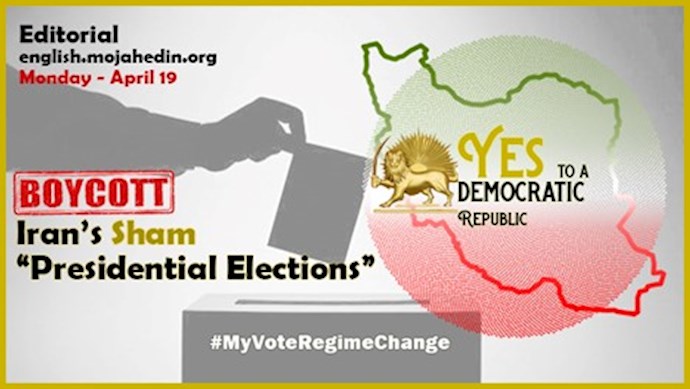This article is part of our coverage of the Iranian regime’s presidential elections
Iran, April 19, 2021—In the previous article of the series, we shed light on the regime’s deep internal and international crises leading to the upcoming presidential elections scheduled for June 18. Iranian regime supreme leader Ali Khamenei has long voiced his preference for a “young and hezbollahi” government and a “Qassem Soleimani like” president.
During the past week, state media in Iran focused mainly was on the “possible candidates” for the elections. Various officials have announced their candidacy, but according to the regime’s media none of them “have enough experience to bring people to the ballot box.”
The most important candidate to this day has been Hossein Dehghan, a former senior official of the Revolutionary Guards (IRGC) and former Defense Minister under the first government of Hassan Rouhani.
But many within the regime believe that “military figures” are not appropriate for the country’s current circumstances. “For the upcoming elections we have the longest list of candidates with a military background,” according to an April 11 piece wired by the state-run IRNA news agency.
“Many portray military figures as efficient, powerful, responsible managers, popular, self-reliant, pacifist, capable and structured potential presidents that can handle all of the country’s economic, domestic and foreign policy issues with their magic stick and achieve all national aspirations in four years!” a piece in the semi-official ISNA news agency reads sarcastically.
Another article in the semi-official ILNA news agency argues that aside from who is going to be running for office in the upcoming elections, the most vital issue for the establishment is getting people to vote.
“The most important element that can bring people to the ballot boxes is the officials' apology to the people for their shortcomings,” reads the ILNA piece, published on April 17.
“In today's society, we are witnessing people giving a cold shoulder and showing indifference to the elections, and if these circumstances continue it is predicted that there will be a sharp decline in votes,” the ILNA piece continues.
This trend also indicates that people feel their presence in the elections is not necessary. In this regard, the state-run daily Aftab Yazd wrote on April 11: “[During Rouhani’s second term], due to the unprecedented manipulation of gasoline prices, unusual currency fluctuations, the U.S. exiting the 2015 nuclear deal (JCPOA), Europe's inability to maintain the JCPOA, and the lack of strong and coherent management that caused many economic problems all joined forces to render despair among the people in the establishment.”
The Aftab Yazd piece also acknowledged the Iranian society’s powder keg status and people’s outrage vis-à-vis the regime. “Skyrocketing prices, unemployment and inflation resulted in unprecedented despair among various classes of our society and thus led to unrests, numerous protests, and demonstrations. Regaining the people’s trust is not easy and the current candidates lack the charisma and capability needed to restore the society’s trust,” the Aftab Yazd acknowledged.
Therefore, there were rumors about possible “charismatic candidates,” such as current judiciary chief Ebrahim Raisi and Hassan Khomeini, the grandson of regime founder Ruhollah Khomeini.
Raisi is specifically known for his leading role in the “Death Commissions” of 1988, consisting of a trio of officials acting as judges and sending 30,000 political prisoners to the gallows after minutes-long trials.
With the post-presidential election protests of 2009 still fresh in his mind, Khamenei strongly fears losing control over the country’s already tumultuous conditions. In 2009 conflicts between various factions created an atmosphere for people to poor into the streets. Aiming to prevent such a development, Khamenei asked Hassan Khomeini in a private meeting to withdraw his candidacy.
The state-run Fars news agency reported on April 13 that “Khamenei did not approve of Hassan Khomeini's candidacy in the election and asked him not to participate in the current circumstances.”
The regime’s media also reported on April 13 that Khamenei has prevented former Majlis (parliament) speaker Ali Larijani from announcing his candidacy.
While we are a month away from official announcements by the candidates, the regime is facing a major task to select a “young and hezbollahi” candidate to lead their apparatus out of the current domestic and international crises.
However, the main dilemma for the mullahs remains the population’s vow to boycott the election. Hamid Reza Taraghi, a so-called principalist in the regime, warned about a low participation in the elections.
“The first and most fundamental problem is people’s dissatisfaction about their livelihood and economic problems that are rooted in government’s policies and its executive system,” said Taraghi to the state-run Vaght Sobh website.
The Vaght Sobh piece adds that according to opinion polls no more than 36 percent of the population consider the economic situation and poor living conditions as the reason for not voting this year. “The pressure with rising prices is increasing on the people,” the piece explains.
It is noteworthy that during the February 2020 legislative elections, the regime announced a less than 42 percent participation, being the lowest outcome in the history of the Islamic Republic.
Whether Khamenei gives the green light to the current candidates or takes the risk to nominate Raisi as his main candidate for the 2021 presidential elections is one issue to keep an eye on in the coming days.





